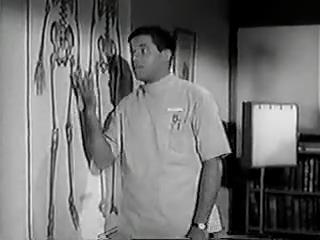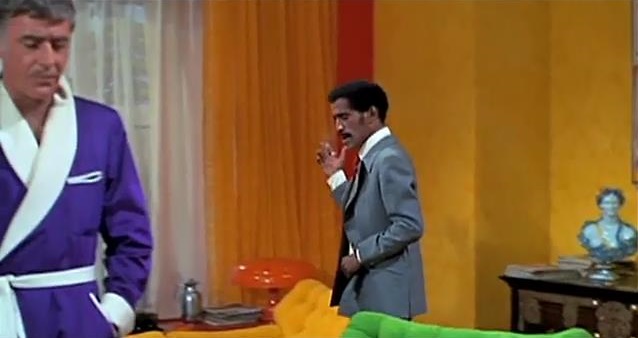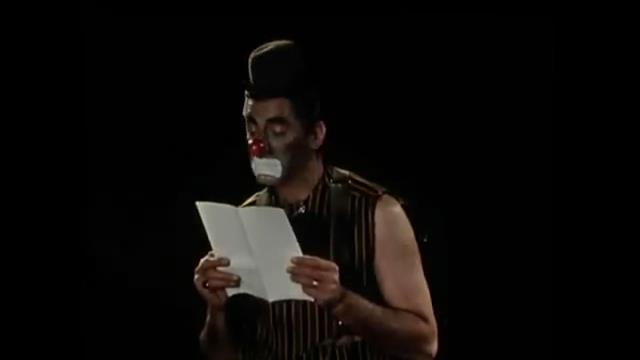The Bellboy
Not a love story,
space story, gangster pic or monster movie, Jack E. Mulcher explains on behalf
of Paramount Pictures (executive producer in charge of all production there),
popular as they are around the world. Fun is the film’s raison
d’être, Mel’s last name in Brooks’ Silent Movie,
“it’s just a little different.”
“No story,
no plot,” says Mulcher.
Night and day in
Miami Beach, the front-line soldiers of the Fontainebleau, “the only
Stanley in the world,” title character.
“A visual
diary,” also says Mulcher.
“Everything
out of the trunk” means the Volkswagen engine, many are called but few
are chosen, “a hit-and-run vacation,” you don’t go there to
diet.
The Ladies Man
The monumental
dollhouse set is the venue for an elaborate and exhaustive rendition of
variations on the eternal feminine so precise and telling they enter the
lodgings of Keaton and Lloyd with ease and in every way prepare the suitably
grandiose labors of Fellini’s La
città delle donne.
The Errand Boy
Paramutual
Pictures, Inc.
The joint
don’t swing, unless the right man sits at the head of the boardroom
roundtable.
Otherwise
it’s a mischegas of script collaborations, oblivious starlets,
dummies, boy wonders, dubbing magic, frenetic flappers, office complexes and
pettifogging demands.
Cassavetes says
he doesn’t know from helicopters and explosions, so he doesn’t film
them, anyway.
Nevertheless, and
in view of the fact that it’s someplace a wee clown can sleep well and a
doll get admired at face value, a studio is a good spot for a director, as
Fellini says.
The Nutty Professor
Kelp’s Kool
Tonic, Beckett’s Bando.
Professor of
Chemistry Julius F. Kelp, he whose pocket watch plays the full-score
Marines’ Hymn, tries Vic Tanny and is reduced.
Rifling the
University Medical Center library of Dr. M. Sheppard Leevee, P.K.M.I.F.O.S.
(Professor Kelp means I’m full of shit) and further holdings, Prof. Kelp
invents it and the Alaskan Polar Bear Heater.
He’s a
wizard on “Black Magic” at The Purple Pit, Buddy Love by name.
All this and Poverty
Records goes into The Patsy,
directly.
It becomes all
the rage, the wife wouldn’t do without it.
Be Somebody----
Be Anybody!
The Patsy
Another bellboy,
another Stanley.
Clothes by Sy Devore,
a hit record, Hedda Hopper, nearly a star, then he plays the Copa Café.
A wake is planned
with Ed Sullivan, but he springs to life, a star.
Born, not made.
He marries the
secretary and runs the firm.
A Little Fun to Match the
Sorrow
Ben Casey

The opening
pronouncement is Eliot’s Sweeney on “birth, copulation and
death.”
The resident who
cannot be taken seriously.
A theme (teleplay
by Chester Krumholz) closely related to Hardly Working and The Day the Clown Cried.
The little boy
aphasic with a brain tumor (prognosis fair), the hunter mistaken for a bear and
shot in the head (“only a matter of time”), the man threatened with
retirement in for tests whose granddaughter won’t have the resident
because....
The dying
hunter’s pregnant wife (“our first”) the resident cannot
bring himself to tell.
“You’re
nothing but a clown! Dr. Dennis Green, clown! That’s all you’ll
ever be!”
Casey a bear when
surgery’s not going well. Dr. Zorba divines the
difficulty.
Well-directed,
the restaurant scene notably recalling Ralph Nelson’s The Jazz Singer in its ambience,
elsewhere The Nutty Professor etc.,
with a crane dolly-in to the purgation.
The Family Jewels
Three pairs of
uncles.
|
The gangster and the expatriate The sailor and the sleuth The photographer and the pilot |
The statement of
the work is in the opening and closing scenes, a foiled armored car heist and a
vacuum filled. Therefore the first pair of uncles convey the action of the
film.
The second pair
have each to do with defusing a bomb.
The third convey
the ladies, young models or elderly passengers.
It can be seen
that the structure, complicated as it is, cannot be at fault in
Crowther’s mystification or Variety’s.
According to
Sarris’s twelve-point “stand against Jerry Lewis” in The
American Cinema (“some skeptical observations on Lewis as an artist
are therefore in order”), “The Family Jewels is badly acted
throughout, but particularly in the setting-up scenes. Never trust an art or an
artist lacking in a passion for detail.” Sarris
goes on to “explain why modern audiences are seldom moved as emotionally
as they think guiltily they ought to be by the five-act tragedies of
Shakespeare.”
Three on a Couch
The artist is
booked on the S.S. President Roosevelt
for a trip to France, where he has won a prize and a commission. His fiancée
refuses to accompany him, she is a psychiatrist with three patients who literally
collapse at the idea of her leaving, each is very beautiful yet suffering from
male rejection. The artist secretly plays a role with each of them, a different
one suited to her exact temperament.
Anna, who is
foreign and fond of Westerns, meets cowboy-hatted rancher Ringo Raintree.
Susan, the
athlete, finds Warren jogging in the park.
Mary Lou, for
whom zoology is a passion and insects a specialty, is introduced to shy
zoologist Rutherford.
At the office
party sendoff bash, and then at the American President Lines dock, the ruse is
clarified.
The Big Mouth
Smuggled diamonds
pass through the Japanese pearl-divers and Kabuki theater complement at Sea
World, under the auspices of Mr. Fong, where they are coated with plastic and
shipped out as pearl necklaces.
One member of the
gang moves differently, with a deal of his own to sell the latest load of
diamonds to a rival mobster, they’re worth millions.
The renegade
comes ashore on the end of a fisherman’s hook, the two are alike as twin
brothers. The Lewis-Richmond script stems entirely from this construction, all
the gags are expressive of the style involved, which proceeds from The Family Jewels or Three on a Couch all the way to Smorgasbord (Cracking Up).
One More Time

“Bonnie
Prince Charlie to the life” (vd. Kimmins)
and his partner in a London nightclub,
|
Bring your arm, Make it handy, For upon my word, There’s the Chocolate Dandy! |
The case presents
an adjunct to The Big Mouth d’après
Richard Donner’s Salt & Pepper,
certainly a question of a blitz on the Atlantic side.
The double is
another Lewis theme, here stemming from Dassin’s Nazi Agent. A Martin and Lewis film might be construed in some
respects.
The screenplay is
signed Michael Pertwee. “Care for a
pinch?”
“What?” Which leads to the great
Hardy sneeze (Bonnie Scotland, dir.
James W. Horne). The “monsters in your
cellar” suggest Landers’ The
Boogie Man Will Get You and Cukor’s Her Cardboard Lover,
the gag is set up to reflect Pinter’s “weasel under the cocktail
cabinet” as literally as possible.
“Let me
tell you the story of big brother, huh? For starters, he joined Interpol,
double-crossed them, then joined the smugglers, double-crossed them, in between times half murders a cat, and then steals a million
in diamonds.” A hunt led by the fox, ending in a Wild West shootout at
The Plaid Cat, “then play it by ear!”
“I got a
flash for ya, my ear can’t ride
either.” Kiddie Indians attack the wagon...
“Closing time, gentlemen.”
New York Times, “this feeble little jape is so rickety and parched for
humor...” TV Guide,
“offers some laughs but overworks”. Time Out, “absolutely appalling.” Catholic News Service Media Review Office, “a contrived and irrelevant diamond smuggling
plot that is terribly forced and unfunny... the timing of all the gags is off,
the plot predictable and the dialogue stupid.” Dan Pavlides (All Movie
Guide), “it fails to be as amusing as the original, which wasn’t that great in
the first place.” Halliwell’s Film Guide,
“even less funny”.
Which Way to the Front?
“The richest
man in the world” and a nightclub comic and a henpecked husband and a
philanderer go ashore at Naples, kidnap Kesselring and end the stalemate, also
they blow up Hitler in his bunker.
This involves a
double for the field marshal, and a plot by the general staff.
The 4-F army has
reasons, which ultimately are moolah from the richest man in the world.
Chaplin’s The
Great Dictator has been mentioned in reviews, this is not the poor barber.
The Day the Clown Cried

Wild rumors are
easily dispelled with recourse to the facts, and we have the screenplay of this
unreleased film for ready consultation.
The main point of
the savage drama is a willful turn on the pivot of Sullivan’s Travels (dir. Preston Sturges). After three years as a political prisoner
in a concentration camp for mocking Hitler in a public bar, the clown is asked
by new prisoners to entertain them. His failure to do so elicits the fury of a
bully, he can’t remember his routines, he needs props, he was fired from
the circus during dress rehearsal for failing to properly hold the top clown’s
inordinately long coattails, pitching them both into the seats, he was once
Doork the Great, cp. The Geisha Boy (dir. Frank Tashlin).
The new prisoners
are crowded into the barracks to make room for a division of the camp into
Aryan and non-Aryan sections. As he kneels in the mud outside, humiliated,
children on the other side of the new barbed wire laugh at him. He makes
himself a mud nose and entertains them.
Fraternization is
forbidden, he is warned and then beaten. A lieutenant has the bright idea of
using him to calm a carload of children inadvertently left on a siding near
town.
The boxcar is
taken to a death camp, he is still inside. A captain offers him his life to
lead the children to their last place of confinement. Hesitating at the end, he
goes in with them.
An absurd legal squabble
has kept the film from exhibition. Some critical remarks by those who have seen
it appear to reflect a misunderstanding similar to that of critics on Which
Way to the Front?, a vehement comedy.
The authenticity
and accuracy of the screenplay are unquestionable, it’s a very great
drama with comedy elements integral to the theme, and very precise indications
of its filming.
Hardly Working
The bank
won’t carry, the circus folds, the star clown is out of a job.
Now he’s the
brother-in-law joke of a banker, cp. Just
Tell Me What You Want (dir. Sidney Lumet).
He’s also
the circus clown set loose on the workaday world, finally the post office
worker who’s a real clown, before packing it in and heading off for clown
college.
He violates
“the sanctity of the mail” by delivering his last batch in makeup
and costume. He marries the boss’s daughter.
The critics could
not savvy the least thing about any of it.
Cracking Up
Smorgasbord, it’s also called. The title sequence picks up from The Patsy picking up ice cubes, not lush
carpets but slickness there’s no standing on.
You can’t
go into a restaurant and have dinner but the divergence of menu choices means
you perish in your own plenty.
The feint of
wisdom (on a bargain airline to London) sinks behind an avalanche and fakirdom.
And so forth, amongst
the best of the Lewis-Richmond comedies.